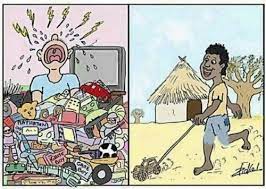People are insatiable creatures. They are always looking for more. No one wants to settle for less. Especially if he had the taste of comfort once, they do not want to leave it again. That is why satiety is no less provocative than hunger.
While there is nothing to lose in hunger, it provokes that there is a lot to lose in satiety. They may steal to feed their family, while a well-off person may commit greater theft in order not to reduce the welfare level of his life, or even because he wants more. This is greed not born of desperation, but insatiability.
This event, which is one of the turning points in history, is a great example of this: the French Revolution. The people, who are not equal to each other and have separate rights and privileges, are divided into classes. The lack of equality in the society, the demand for political rights by the bourgeois who got rich and pay taxes to the state, moreover, the support of the bourgeois class by the peasants who had no rights and worked in the heaviest jobs had a great impact on the outbreak of the French Revolution. One of the reasons for a great revolution here was that the bourgeois was insatiable and wanted much more than they had, and the peasants supported the bourgeoisie, perhaps just because they could continue to live.
As a result, losing the familiar is as stimulating as the unknown. Losing after a long time is more difficult than not winning at all. Humanity has never been satisfied with what it has. It has always wanted more and better. He was always greedy and never appreciated what he had. This shows that humanity is very insatiable. Make a says of Ibn Khaldun: “Hunger does not kill people, but the fullness they are used to does.”

